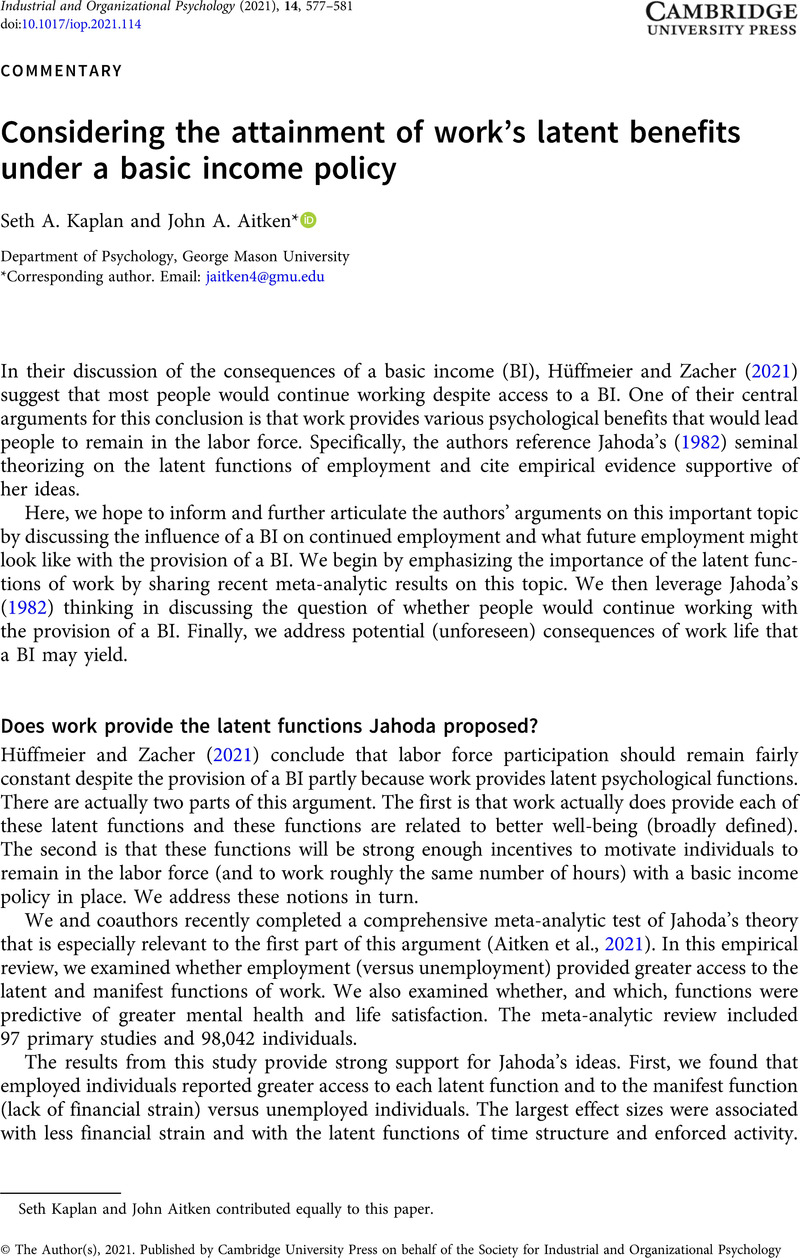No CrossRef data available.
Article contents
Considering the attainment of work’s latent benefits under a basic income policy
Published online by Cambridge University Press: 14 December 2021
Abstract
An abstract is not available for this content so a preview has been provided. Please use the Get access link above for information on how to access this content.

- Type
- Commentaries
- Information
- Copyright
- © The Author(s), 2021. Published by Cambridge University Press on behalf of the Society for Industrial and Organizational Psychology
Footnotes
Seth Kaplan and John Aitken contributed equally to this paper.
References
Aitken, J. A., Kaplan, S. A., Cannon, J., & Kim, H. (2021, July 29–August 4). On the functions of work: Ameta-analysis of Jahoda’s latent deprivation model [Paper presentation]. The 81st Annual Meeting of the Academy of Management, Philadelphia, PA.10.5465/AMBPP.2021.15266abstractCrossRefGoogle Scholar
Fryer, D. M. & Payne, R. L. (1984). Pro-active behaviour in unemployment: Findings and implications. Leisure Studies, 3, 273–295. https://doi.org/10.1080/02614368400390231
CrossRefGoogle Scholar
Furnham, A. (2014). The new psychology of money. Routledge.10.4324/9780203506011CrossRefGoogle Scholar
Guest, D. E. (2017). Human resource management and employee well-being: Towards a new analytic framework. Human Resource Management Journal, 27(1), 22–38. https://doi.org/10.1111/1748-8583.12139
CrossRefGoogle Scholar
Hasdell, R. (2020). What we know about universal basic income: Across-synthesis of reviews. Basic Income Lab.Google Scholar
Highhouse, S., Zickar, M. J., & Yankelevich, M. (2010). Would you work if you won the lottery? Tracking changes in the American work ethic. Journal of Applied Psychology, 95(2), 349–357. https://doi.org/10.1037/a0018359
CrossRefGoogle Scholar
Hoynes, H., & Rothstein, J. (2019). Universal basic income in the United States and advanced countries. Annual Review of Economics, 11, 929–958. https://doi.org/10.1146/annurev-economics-080218-030237
CrossRefGoogle Scholar
Hüffmeier, J., & Zacher, H. (2021). The basic income: Initiating the needed discussion in industrial, work, and organizational psychology. Industrial and Organizational Psychology: Perspectives on Science and Practice, 14(4), 531–562.Google Scholar
Jahoda, M. (1982). Employment and unemployment: Asocial-psychological analysis. Cambridge University Press.Google Scholar
Melin, A., & Egkolfopoulou, M. (2021, June 1). Employees are quitting instead of giving up working from home. Bloomberg.
https://www.bloomberg.com/news/articles/2021-06-01/return-to-office-employees-are-quitting-instead-of-giving-up-work-from-home
Google Scholar
Organisation for Economic Co-operation and Development (OECD). (2017). Basic income as a policy option: Can it add up? https://www.oecd.org/social/Basic-Income-Policy-Option-2017.pdf
Google Scholar
Paulsen, R. (2008). Economically forced to work: Acritical reconsideration of the lottery question. Basic Income Studies, 3(2), 1–20. https://doi.org/10.2202/1932-0183.1104
CrossRefGoogle Scholar
Selenko, E., Stiglbauer, B., & Batinic, B. (2020). More evidence on the latent benefits of work: Bolstered by volunteering while threatened by job insecurity. European Journal of Work and Organizational Psychology, 29(3), 364–376. https://doi.org/10.1080/1359432X.2019.1706487
CrossRefGoogle Scholar
Sinclair, R. R., Allen, T., Barber, L., Bergman, M., Britt, T., Butler, A., Ford, M., Hammer, L., Kath, L., Tahira Probst, T., & Yuan, Z. (2020). Occupational health science in the time of COVID-19: Now more than ever. Occupational Health Science, 4, 1–22. https://doi.org/10.1007/s41542-020-00064-3
CrossRefGoogle Scholar
Society for Human Resource Management. (2016). Employee job satisfaction and engagement: Revitalizing a changing workforce. https://www.coursehero.com/file/26771913/2016-Employee-Job-Satisfaction-and-Engagement-Reportpdf/
Google Scholar
Waters, L. E., & Moore, K. A. (2002). Reducing latent deprivation during unemployment: The role of meaningful leisure activity. Journal of Occupational and Organizational Psychology, 75(1), 15–32. https://doi.org/10.1348/096317902167621
CrossRefGoogle Scholar


